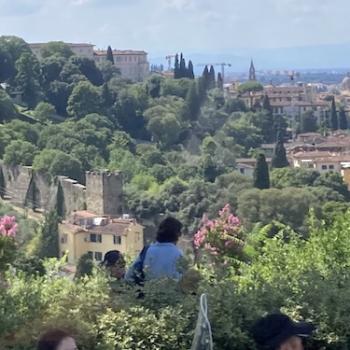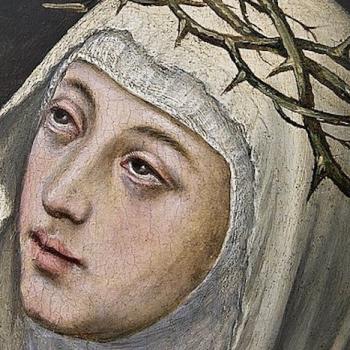
To be a believer, for Saint Paul, is to be part of a family formed by a trust in the mystery that lies at the heart of all things.
Church as Extended Family
In his pastoral epistles to Timothy, Paul shows that he only barely intends us to think of “family” as a metaphor. The second letter opens with a recollection of his own ancestors who served God, and of the faithful service of Timothy’s mother and grandmother.
I say “barely,” because alongside these references to actual family members, Paul speaks of metaphorical bonds as well. He addresses Timothy as “my beloved Child,” and offers him “grace, mercy, and peace from God the Father.” Remember what your grandma taught you, recall what I taught you, and remember what our Father gives us all.
This “extended family” is what Paul means by “church.” That word is his name for a human society formed not by the social bonds that weddings and births generate. Instead, it is formed by trust in a mystery. “Without any doubt,” he says, “the mystery of our religion is great.” And then he quotes what appears to be one of the many early Creeds:
He was revealed in flesh,
vindicated in spirit, seen by angels,
proclaimed among Gentiles,
believed in throughout the world,
taken up in glory (1 Tim 3:16).
A great mystery indeed. All who saw the risen and ascending Jesus, and/or heard him proclaimed, belong to this new family. This community includes, in these letters, angels, widows, and human slaves. That suggests that this new family is clearly socially and ontological diverse in a way that the biological family never could be. To “believe in”—or “on” as the ESV has it—this mystery is to participate in the ethical formation of this new family.
Christian Ethics 101
You might think a Christian lifestyle would look totally unique. How bizarre, to be formed on a faith in a Jewish Messiah whose resurrection was seen only by angels. But what I find remarkable about these Epistles is the way the actual family remains at the center of the ethic of extended one.
If a widow is in need, for instance, the first stop is her children or grandchildren. They “show godliness”—or trust in the mystery—by caring for her (1 Tim 5:4). If they neglect her, they have denied the faith (5:8).
Young people—like Timothy himself—need from the elderly a chance to try out their gifts, and discover their own voices. Old people require respect and care from the young. They can teach young people how to use those gifts well, and how to keep trusting even when trust gets difficult. Remember what Grandma Lois taught you: that God did not give us a spirit of fear, but of “power, love, and self-control” (2 Tim 1:7).
Think too of how we learn to manage money in the microeconomies of our homes. Lust for money, Paul says several times, is a social problem. And its roots are in mis-perception. That is to say, true wealth is generosity, not accumulation. To be “rich in this present age” (6:17) without generosity is to be driven by the fear that our grandmothers warn us against. So a Christian ethic of money is not unlike learning to be good at negotiating money with our siblings and parents.
How We Live at Home
Deacons and bishops are those servants of the mystery who will guide a church, teach the gospel, and oversee the finances. How does someone qualify for these roles? Well, Paul says, it begins with what kind of person one is at home. Are they faithful spouses and parents? Are they skilled at guiding their own children toward wisdom, respect, and courage (1 Tim 3)?
The same habits that make one a faithful family member can equip a person to be a leader in the extended family of faith.
Many aspects of Paul’s vision seem obvious to us. Some seem offensive. Both kinds suggest significant things about the Ephesian community to whom he writes. So, for the obvious sort of ethic: men should be but the husband of one wife (1 Tim 3). That suggests that not all were. An offensive bit of instruction: women should not have authority over men (1 Tim 2). That suggests that some did.
The instructions to slaves (1 Tim 6:1-2) are particularly hard to read. Paul doesn’t seem to have imagined a society without at least bond-enslavement. Here he speaks to slaves, as members of the Christian family, and tells them to respect and even love their baptized masters. Your masters are, in the church, your brothers and sisters; but that doesn’t make you equals at home. Rather, it calls you to serve them as both masters and beloved children of God. Your membership in their household structures your relationship to them. At the same time, your membership in the church challenges that social structure.
The Family-Making Mystery
What I notice about all this is, first, that I’m not interested in rebooting Paul’s 1st Century Mediterranean ethic. Even some ancient Christians 200 years after Paul were ready to have women in leadership. Some (Gregory of Nyssa, eg) were also ready to argue that all slavery is evidence of sin. They were working out the implications of Christian freedom in a way that Paul’s limited horizons did not allow.
Secondly, I notice that, for the Apostle, the mystery of all things lives very close to the ground. We Christians are people who see and proclaim strange things. Christ has dies, risen and ascended. And yet we show our faith in this gospel in the same way that we show our faithfulness to the people we share a house with. Listening, encouraging, guiding, being generous with our time and money.
Angels and gossipy old people and intelligent young women all witnessed these mysteries alongside Paul and Timothy. So did charismatic slaves, bigamous husbands, and teenagers who didn’t want to visit Grandma.
This messy world of human families is precisely where we learn to practice our faith. Our strange faith in the “great mystery” of God’s loving generosity toward us. It’s where our trust bodies forth as godliness. The mystery itself is beyond all words. But the life it calls us to is no more mysterious than the common miracle of emerging from the wilds of family life as courageous and generous human beings.










